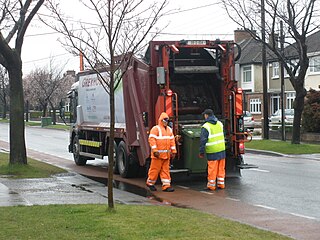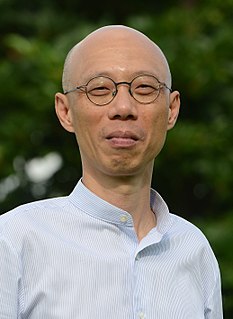
Plastic shopping bags, carrier bags, or plastic grocery bags are a type of plastic bag used as shopping bags and made from various kinds of plastic. In use by consumers worldwide since the 1960s, these bags are sometimes called single-use bags, referring to carrying items from a store to a home. However, it is rare for bags to be worn out after single use and in the past some retailers incentivised customers to reuse 'single use' bags by offering loyalty points to those doing so. Even after they are no longer used for shopping reuse for storage or trash is common, and modern plastic shopping bags are increasingly recyclable or compostable. In recent decades, numerous countries have introduced legislation restricting the sale of plastic bags, in a bid to reduce littering and plastic pollution.

A plastic bag, poly bag, or pouch is a type of container made of thin, flexible, plastic film, nonwoven fabric, or plastic textile. Plastic bags are used for containing and transporting goods such as foods, produce, powders, ice, magazines, chemicals, and waste. It is a common form of packaging.

Shopping bags are medium-sized bags, typically around 10–20 litres in volume, that are used by shoppers to carry home their purchases. Some are intended as single-use disposable products, though people may reuse them for storage or as bin liners, etc.; others are designed as reusable shopping bags.

A duty-free shop is a retail outlet whose goods are exempt from the payment of certain local or national taxes and duties, on the requirement that the goods sold will be sold to travelers who will take them out of the country. Which products can be sold duty-free vary by jurisdiction, as well as how they can be sold, and the process of calculating the duty or refunding the duty component.
Pay as you throw (PAYT) is a usage-pricing model for disposing of municipal solid waste. Users are charged a rate based on how much waste they present for collection to the municipality or local authority.

Environmental Protection Department (EPD) is a department of Hong Kong Government concerning the issues of environmental protection in Hong Kong.The EPD is responsible for developing policies covering environmental protection, nature conservation; enforcing environmental legislation; monitoring environmental quality; providing collection, transfer, treatment and disposal facilities for many types of waste; advising on the environmental implications of town planning and new policies; handling pollution complaints and incidents; and raising awareness and support in the community for environmental initiatives.

Woolworths Holdings Limited is a South African multinational retail company that owns the South African retail chain Woolworths, and Australian retailers David Jones and Country Road Group. Woolworths, however, has no association to Australia's Woolworths supermarket chain.
A landfill tax or levy is a form of tax that is applied in some countries to increase the cost of landfill. The tax is typically levied in units of currency per unit of weight or volume. The tax is in addition to the overall cost of landfill and forms a proportion of the gate fee.
The Green Student Council is a non-profit organisation concerning local environmental problems that was founded in August 1993, in Hong Kong, China. Members include accountants, teachers and lawyers, as well as university students. They are expected to bring the idea of environmental protection to the fields they are in.
SITA is the main brand representing Suez Environnement's waste subsidiaries in Europe, North America, the Asia Pacific zone and Australia.

Rates of household recycling in Ireland have increased dramatically since the late 1990s. The Irish Environmental Protection Agency (EPA) is the agency with overall responsibility for environmental protection in the Republic of Ireland and monitors rates of recycling in Ireland along with other measures of environmental conditions in Ireland. The EPA, along with Repak, the principal organisation for packaging recycling in Ireland, report on recycling rates each year. In 2012 Ireland’s MSW recycling rate was 34%, while the rate of packaging recycling reached 79%. The amount of municipal waste generated per person per year in the Republic of Ireland has fallen significantly in recent years. This figure remains above the European Union annual municipal waste average of 503 kg per person, however. Each local council in Ireland has considerable control over recycling, so recycling practices vary to some extent across the country. Most waste that is not recycled is disposed of in landfill sites.

Cyperus malaccensis or short-leaved Malacca galingale is a species of thin long sedge grass. It is planted in the land between the sea water and fresh water, mainly in Vietnam, and processed in Dongguan. It is also called salt water grass.
In the densely populated Hong Kong, waste is a complex issue. The territory generates around 6.4 million tons of waste each year but is able to collect and process only a minimal portion of recyclable waste. By 2019, its existing landfills are expected to be full. The government has introduced waste management schemes and is working to educate the public on the subject. On the commercial side, producers are taking up measures to reduce waste.

A reusable shopping bag is a type of shopping bag which can be reused many times, in contrast to single-use paper or plastic shopping bags. It is often a tote bag made from fabric such as canvas, natural fibres such as jute, woven synthetic fibers, or a thick plastic that is more durable than disposable plastic bags, allowing multiple use. Other shoppers may use a string bag or a wheeled trolley bag.
In the early 21st century, there has been a global movement towards the phase-out of lightweight plastic bags. Single-use plastic shopping bags, commonly made from low-density polyethylene (LDPE) plastic, have traditionally been given for free to customers by stores when purchasing goods: the bags have long been considered a convenient, cheap, and hygienic way of transporting items. Problems associated with plastic bags include use of non-renewable resources, difficulties during disposal, and environmental impacts. Concurrently with the reduction in lightweight plastic bags, shops have introduced reusable shopping bags.

Wong Kam-sing, GBS, JP, with his ancestral home in Shunde, Guangdong, is a Hong Kong architect. Before serving as the current Secretary for the Environment, Wong had held a number of public service positions, including the first Chairman of the Environment and Sustainable Development Committee of the Hong Kong Institute of Architects, the Chairman of the Professional Green Building Council and the Vice Chairman of the Hong Kong Green Building Council. He has contributed to the promotion and research of the standards and guidelines for sustainable built environment applicable to the high-density urban environment of Hong Kong.

Red-white-blue bag or laundry bag is a carriage bag made out of nylon canvas in colors of red, white and blue. It originated in Hong Kong in the 1960s and has become a representative of Hong Kong culture. Because the nylon canvas is known of its light, firmness and durable usage, it is commonly used as hand carry luggage and transport between Mainland China and Hong Kong.

Proposition 67 was a California ballot proposition on the November 8, 2016 ballot. A "Yes" vote was to approve, and a "No" vote to reject, a statute that prohibits grocery and other stores from providing customers single–use plastic or paper carryout bags but permits the sale of recycled paper bags and reusable bags for a fee.
In Hong Kong, domestic waste has always been the largest portion of municipal solid waste. In 2014, domestic waste constitutes 65% of municipal solid waste, and 43% of total solid waste at landfills. Hong Kong has the highest daily domestic waste generation rates per capita compared to other metropolitans in Asia: Metro Tokyo creates 0.77 kg per day per capita, Seoul generates 0.95 kg, Taipei City produces 1.00 kg and Hong Kong tops the rank by 1.36 kg.

The phase-out of lightweight plastic bags in Australia is being implemented by the states and territories rather than nationally, with plastic bag bans implemented in all jurisdictions except New South Wales, where it remains under discussion.













